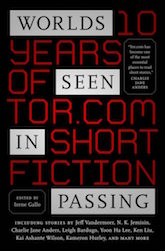Short fiction is awesome.
No, seriously. I am of the opinion that there are few things in life better than a perfectly executed short story. Creating an expertly paced short story, that makes you care about its characters, understand its world, and be invested in its central conflict—all within the space of 7,500 words—is no small feat. What follows are six pieces of subversive short fiction—stories that have captured my heart and imagination (in less time it takes to ride the subway to work, no less). These are stories that stretch the definition of “fiction” and play with format; they are stories that defy convention and sometimes even storytelling logic.
“Hungry Daughters of Starving Mothers” by Alyssa Wong (Nightmare Magazine)
Alyssa Wong is a multi-award winning author for so many of her works of short fiction. This particular story, about that Tinder life in New York City, about hunger, about friendship, and home? Oh, it’s so twisted and sick and, like its main character, you can’t help but want to eat every last drop of it up.
“The Husband Stitch” by Carmen Maria Machado (Granta)
With stories that are eerie yet rooted in the familiar, Carmen Maria Machado is one of the most disturbing and incisive short fiction writers today. In “The Husband Stitch” she examines the urban legend of the woman who wears a ribbon around her neck, who tells her husband time and time again that he may not touch it or remove it. This particular version of the story examines the path to conventional, heterosexual marriage—and the horror therein.
“Rib” by Yukimi Ogawa (Strange Horizons)
Yukimi Ogawa is one of our favorite authors because her work is unexpected, often horrific, and always enthralling. Weaving Japanese folklore in with the new, the weird, and science fiction horror elements, Ogawa’s body of work is prolific and evergreen. In “Rib,” Ogawa employs a yokai main character—a hone-onna, or skeleton lady—who befriends an orphan, and subverts expectation of the bond between monster and child.
“Application for the Delegation of First Contact: Questionnaire, Part B.” by Kathrin Köhler (Book Smugglers Publishing)
This is a short story that we published back in 2015, after setting up an open short story call for tales that entertained the theme of “First Contact.” Katherine Köhler’s short story came in the form of several questions—an application form that one would have to fill out for consideration to be included in the Federation’s Delegation of First Contact with alien species. The questions Köhler asks range from the poignant to the absurd, and every single one of them makes you think about what it means to be a sentient, intelligent creature in the cosmos.
“Cat Pictures Please” by Naomi Kritzer (Clarkesworld)
This short story from Naomi Kritzer won the Hugo Award in 2016 and for good reason—it’s a short story about an AI that is obsessed with cat pictures. Responsible for improving the algorithm that powers a Google-like search engine, this AI learns about its users and conducts its own experiments–naturally predisposed to those humans who upload a lot of cat pictures. By turns silly and serious, “Cat Pictures Please” is never what you think it will be—and isn’t that part of the joy of subversive short fiction?
Buy the Book


Worlds Seen in Passing: Ten Years of Tor.com Short Fiction
“The Water That Falls on You From Nowhere” by John Chu (Tor.com)
John Chu’s Hugo Award-winning short story is speculative fiction that takes a simple premise—water that falls on you, from nowhere, when you lie—and uses it to examine the intricate bonds between a son and his family, and his love. This is a quiet story about love, insecurity, and trust, and we love every beautiful word of it.
So there you have it! Six short stories that defy convention and expectation—are there any favorites that you have to recommend?
This article was originally published in September 2017.
Thea James is a Hapa Filipina-American who works for Penguin Random House by day, and is a Book Smuggler by night. When she’s not at The Book Smugglers or swamped in pending papers and proposals, she can be found blogging over at Kirkus with her Book Smuggler colleague Ana Grilo. (If she’s not there either, try the local bar.)











“Jefty was Five” by Harlan Elison is one of the best reads I’ve ever encountered.
If you love short stories, check out “Reality as strange as it seems” by Nic Smada. Stories of every genre. Guaranteed to make you laugh, cry or just be amazed and give you something to talk about.
The Nine Billion Names Of God by Carter Scholz.
Although the two stories I am about to recommend are short novels and not short stories, the tenor of them fit well with the six, all excellent I must say, stories presented here.
Fever Dream by Samanta Schweblin carries the nebulous menace of these six stories and it asks the reader to favor a spell cast by the author over imposing reason upon the narrative. Threats by Amelia Gray offers the same level of lack of finality as Fever Dream, yet does an excellent job of injecting the unreliable narrator’s thoughts into your own as you go about your day. The experience of reading it is like a fever dream.
Each of these books play with the expectations of the reader, and I reluctantly admit that by reading them back to back, I felt a little unmoored.
I only bother to offer these shorter novels to those who have enjoyed reading these short stories, for you may find yourself momentarily without a new short story to read, conveniently forget that there are plenty on tor.com, and these books may become your next best friends.
“Tlon Ubar Orbis Tertius” by Jorge Luis Borges. I consider it the first, and by far the best, of an unintended trilogy that also includes “The Nine Billion Names of God,” by Arthur C. Clarke, and “The Last Question,” by Isaac Asimov–three exhilarating stories of the WWII/post-WWII era that describe a sudden, fundamental transformation of the very nature of reality.
Perhaps I’m just old-fashioned, but I always think of Time Considered As A Helix Of Semi-Precious Stones when I think of an unconventional short story. At least, it was when it was new. It may have set some of today’s conventions.
You missed the Woof books! Hilarious dog comedy. Just right for a quick read and guaranteed to make your day.
Ah, clever subversion, a lost art.
I was surprised not to see any James Tiptree Jr/Alice Sheldon! She always threw in elements that rebelled against our cultural norms, seems like every other protagonist is like “Screw this…” and jets off to live with aliens (who are much nicer than “humans”).
“The Women Men Don’t See” is a good taste, and “Screwfly Solution” is a classic.
Thirteen Ways of Looking at Space/Time by Catherynne M. Valente is one of my favorites, and available free online: http://clarkesworldmagazine.com/valente_08_10/
Almost anything by Anthony Doerr — particularly from his collection Memory Wall (which includes many SF themed stories) and his collection The Shell Collector which is less science fictiony but includes much science and it just simply amazing. He is a Poet!
Hey Devin! Thanks for that link to “Thirteen Ways!” I love it!
Glad to hear it Kenny!
Other than the Tiptree stories, already mentioned above, I’d say the short story most convention-defying I’ve ever read is “Congenital Agenesis of Gender Ideation by K. N. Sirsi and Sandra Botkin”, by Raphael Carter, which won the Tiptree Award in 1998.
Devin, wow, thanks for that link to Valente’s story… wow!
Thirteen Ways of Looking at Space/Time
— by CATHERYNNE M. VALENTE —
2011 FINALIST: THE LOCUS AWARD FOR BEST SHORT STORY
I.
In the beginning was the Word and the Word was with God and the Word was a high-density pre-baryogenesis singularity. Darkness lay over the deep and God moved upon the face of the hyperspatial matrix. He separated the firmament from the quark-gluon plasma and said: let there be particle/anti-particle pairs, and there was light. He created the fish of the sea and the fruits of the trees, the moon and the stars and the beasts of the earth, and to these he said: Go forth, be fruitful and mutate. And on the seventh day, the rest mass of the universe came to gravitationally dominate the photon radiation, hallow it, …
and much more!